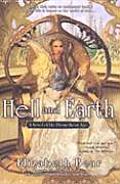
| Series: | Promethean Age #4 |
| Publisher: | Roc |
| Copyright: | August 2008 |
| ISBN: | 0-451-46218-1 |
| Format: | Trade paperback |
| Pages: | 419 |
Hell and Earth is really the second half of a novel, The Stratford Man. The first half was published as Ink and Steel. This book opens with Act IV of the story and shouldn't be read on its own.
The end of Ink and Steel was so climactic that it's hard at first to remember where the rest of the story was going. But the events that so dominated the end of Ink and Steel were an interlude of sorts to the struggles within the Prometheus Club, the major villains in Elizabethan England are still at large, and Christopher Marley (Kit) now has a few new hangups to deal with. He also has quite a bit more power (not that it seems to do him much good).
At the start, we pause to reset the stage, but tension comes quicker and events move faster than in Ink and Steel. Hell and Earth is less concerned with faerie and more with our Earth, particularly with Richard Baines and the queen's opponents within the Prometheus Club. Faerie is now more of a resource to draw upon than a major setting; most of this book takes place in London, attempting to untangle the plots and schemes of Baines and his allies and benefactors. There's quite a bit more action in that sense: more fights, more direct struggles of magic, and more direct contact with royalty. It has less of a tone of skullduggery and maneuvering and more of open or at least barely hidden warfare, mostly magical.
Ink and Steel was, for me, primarily about Will and Kit's friendship. That's of course still present here, but it didn't feel as prominent of a plot driver, in part because it's firmer and not as questioned. This is instead Kit's story: his desire for revenge, his attempt to come to terms with what happened to him in Ink and Steel, and most importantly his attempt to come to terms with what Baines did to him long ago. Exactly what was done and what Kit carries with him is the primary plot of Hell and Earth. It's a great revelation and plot twist, bringing in new questions of morality, metaphysics, and some subtly excellent bits of Christian mythology.
Bear does a better job here at cluing the reader in to what's going on. I wasn't nearly as confused as I was at times in the previous book. Despite quite a bit of court intrigue, there's no dramatis personae here and no need for one: I had very little trouble keeping track of who was who. One of the better techniques Bear uses this time is, when one of Will or Kit (usually Kit) is doing something emotionally dramatic, to tell the scene from the perspective of the other. The running mental commentary fills in quite a bit of the subtext.
On the negative side, for some reason the entangling with English history struck me a bit wrong, particularly towards the second half of the book. This is certainly not a historic quibble — I know far too little about this part of history to do that — but more of a subjective feel thing. The story ties in with some major events in history and offers alternative background and motives, and to me that connection felt a bit stretched. I think I would have done better with either more real history background or less, but the amount here felt oddly like name-dropping rather than alternative or secret history. (This may just be a symptom of the hard time I have with secret history in general.)
The pain, angst, and sickness also got a touch tiresome. There are a couple of extended sickness or captivity scenes that dragged on longer than I wanted. I have a low tolerance for fevered incoherence in novels. Kit also spends much of the book getting hammered on emotionally by Baines, and while it's effective in building up hatred in the reader, it can be a little hard to put up with Kit's ineffectiveness. It's valid characterization, but it's frustrating.
I think this is a more even book than Ink and Steel, but none of it grabbed me emotionally like the second half of that book. The closest it came to that feeling was the intricate interplay between Kit and Lucifer, which has some excellent moments. But apart from that, while there's a lot of tense action, I had a harder time becoming emotionally engaged.
It's still a good book, and if you liked Ink and Steel you should of course read it for the rest of the story. But if you didn't like Ink and Steel, this isn't going to change your mind.
Reviewed: 2008-12-31